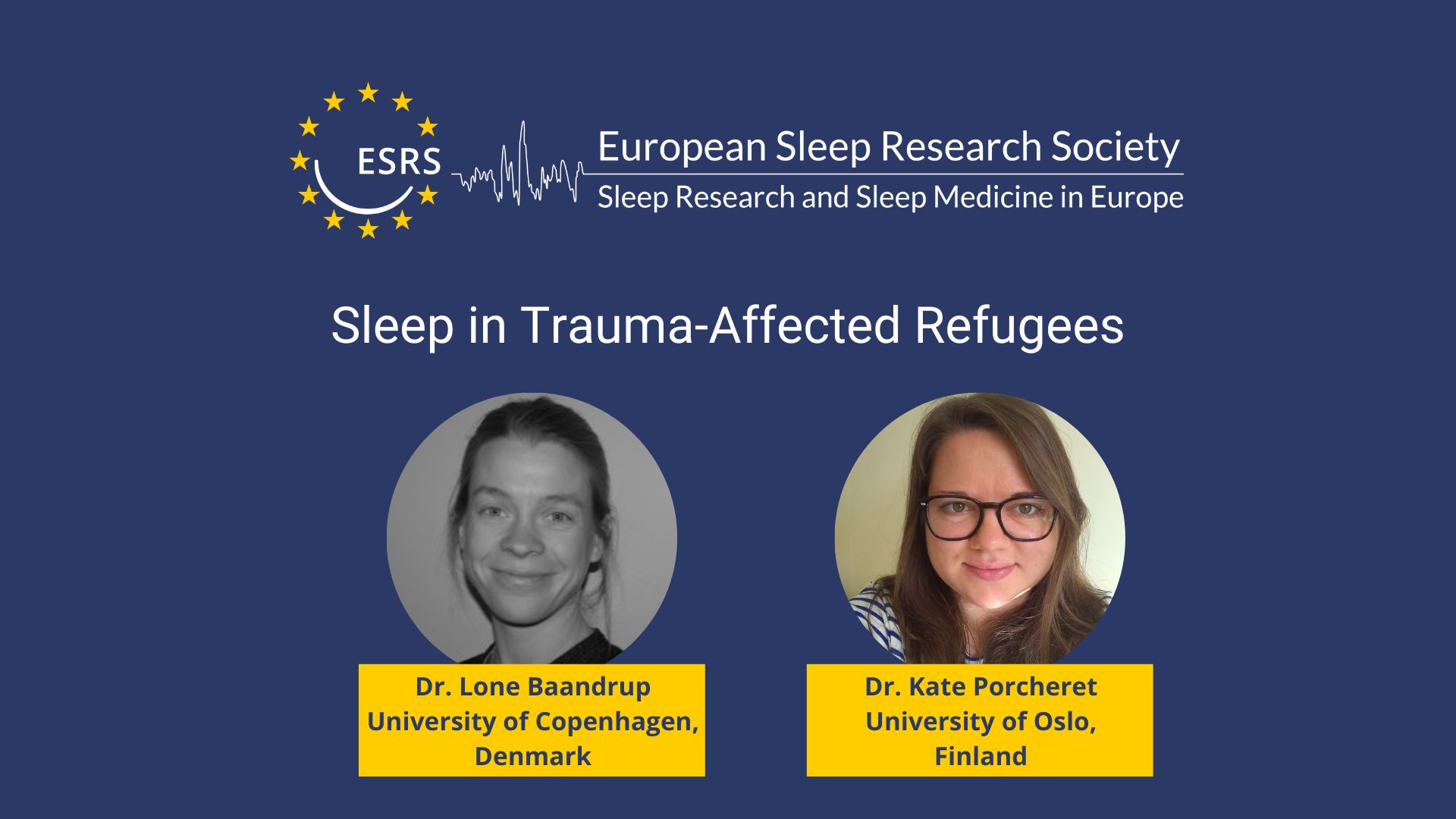Sleep in Trauma-Affected Refugees
Dr. Lone Baandrup and colleagues Hinuga Sandahl, Poul Jennum, Erik Lykke Mortensen and Jessica Carlsson recently published two papers looking at trauma informed treatment of sleep problems in refugees: “Trauma informed treatment of sleep problems in refugees: Imagery rehearsal therapy and/or mianserin in treatment of refugees diagnosed with PTSD: Results from a randomized controlled trial.” (Sandahl et al. 2021) and “Investigating the link between subjective sleep quality, symptoms of PTSD, and level of functioning in a sample of trauma-affected refugees” (Sandahl et al. 2021). Dr. Kate Porcheret from the ESRS’s Digital & Communications Committee sat with her to discuss their work on sleep in trauma-affected refugees.
These publications were based on a randomized controlled trial with trauma affected refugees with PTSD. Refugees have a high risk of developing PTSD and are also prone to experiencing sleep problems and disruptions. Dr. Baandrup and colleagues were particularly interested in sleep in relation to PTSD symptoms, level of functioning and treatment response.
They sought to determine the efficacy of the treatment they investigated – Image Rehearsal Therapy (IRT) and mianserin – as add-on treatment to treatment as usual (TAU). TAU consisted of a multicomponent treatment strategy including medical treatment from a physician, physiotherapist and psychologist in varying combinations over an 8 – 12-month period.
Treatment Options
Image Rehearsal Therapy
IRT aims to train patients in alternative dream content to replace nightmares, which are connected to a specific traumatic event. It has shown promising results in patients with PTSD by improving total sleep time and sleep quality, and by improving the symptoms of PTSD.
Mianserin
Mianserin is a sedating noradrenergic and specific serotonergic antidepressant which resembles the more frequently prescribed antidepressant mirtazapine but with a shorter half-life.
Findings
It was hypothesized that the combination treatment would be superior, but the only significant finding in this trial was actually for IRT on the level of daily functioning. There were no other beneficial effects when compared to treatment as usual. However, the effects might’ve been underestimated in this trial due to low adherence rates – which is an important consideration for the treatment of such populations.
These results call for further exploration of the motivation and the ability of trauma affected refugees to participate in and benefit from these kinds of treatments that were offered.
In a second publication, they sought to look at all treatment options to evaluate specific effects of the intensity of sleep disturbances to see if they were related to the improvement in PTSD symptoms.
In this study they found that PTSD treatment response was closely related to improvement in general wellbeing and improved sleep quality. Making specific efforts to improve sleep quality will enhance treatment response in terms of the improvement of PTSD symptoms.
For even further insights on this topic, watch the interview below:
ESRS Reminders
Sleep Europe 2022 Late Breaking Abstract Submission Open
We are now accepting submissions for late breaking abstracts. These abstracts should contain data or relevant information that was not yet known or available by the normal submission deadline (26 April 2022). Please note, the late breaking submission period is intentionally long to accommodate summer vacations, and no extensions will be made.
Submission Deadline: 16 August 2022
More details here.
Sleep Europe 2022 Registration Open
The ESRS Board is pleased to announce that registration is now open for Sleep Europe 2022 in September in Athens, Greece. We look forward to seeing you there in-person for an exciting programme including new teaching courses, more keynote speakers than ever before and numerous sessions based on our six educational tracks. View the entire scientific programme and register today.
Sleep & Health Webinar – Save the Date
Save the date for the upcoming Sleep & Health webinar to be hosted on Tuesday, 12 July 2022 at 17:00 – 18:00 CEST. This will be chaired by Prof. Dr. Claudio Bassetti, where he will also be joined by Prof. Drs. Tiina Paunio and Dirk Pervernagie. Register today!
Apply for Research Grants
The ESRS has recently launched a grant in support of Ukrainians leaving Ukraine due to the conflict. This research grant is for a 3-month study stay aimed at sleep researchers, investigators, scientists and clinicians.
Applications will be accepted on a rolling basis.
More details here.
The ESRS supported by our corporate member Bioprojet, is offering a 10.000 € grant to support a young physician working in the field of daytime sleepiness. The grant should support an ongoing or new research project and should be completed within three years.
Application Deadline: 24 June 2022
More details here.
Recent publications from ESRS members
Van den Bossche et al. (2022). Multimodal phenotypic labelling using drug-induced sleep endoscopy, awake nasendoscopy and computational fluid dynamics for the prediction of mandibular advancement device treatment outcome: a prospective study. J Sleep Res.
Sigurðardóttir et al. (2022). Female sex hormones and symptoms of obstructive sleep apnea in European women of a population-based cohort. PLoS One.
van der Heijden et al. (2022). Sleep spindle dynamics suggest over-consolidation in post-traumatic stress disorder. Sleep.
Marin-Oto et al. (2022). Soluble RAGE in COPD, with or without coexisting obstructive sleep apnoea. Respir Res.
Lesku & Schmidt (2022). Energetic costs and benefits of sleep. Curr Biol.
Léotard et al. (2022). Non-invasive ventilation in neuromuscular diseases: should we use higher levels of ventilatory support? Sleep Breath.
Forthun et al. (2022). A shift to something better? A longitudinal study of work schedule and prescribed sleep medication use in nurses. Occup Environ Med.
Lušić Kalcina et al. (2022). The construction of the Split Sleep Questionnaire on sleep habits during the COVID-19 pandemic in the general population. Croat Med J.




